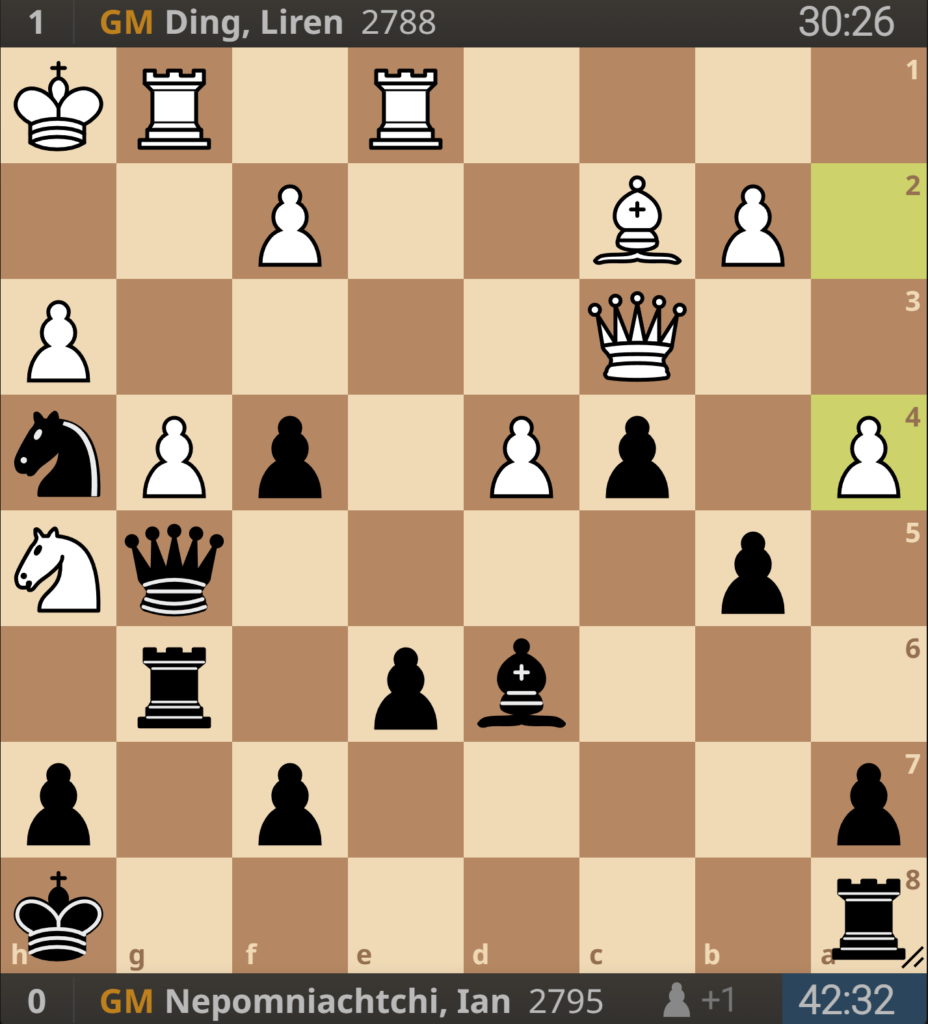Every single time I thought I found an extremely sophisticated, “genius” solution to a simple problem, I was mistaken. I can recall dozens of games where I made silly mistakes simply because I wanted to be too smart. I quickly spotted the logical, obvious move, but then continued to calculate and found an ‘even smarter’ way to proceed.
I am not the only one to make such mistakes. In the recently concluded World Championship Match between Ding Liren and Ian Nepomniachtchi, the most decisive results came due to rather simple mistakes and not because of brilliant moves.
The moment that was most striking to me was in game 12, when Nepomniachtchi led the match and was objectively winning with black. This win would have all but finished the match. Even a draw was a great result.

On move 26. Nepo had a choice: keep the extra pawn with the simple 26…a6 or win with style points by playing 26…b4 and going for an attack.
In under 5 Minutes, Nepo went for 26…b4 which is objectively still winning, but making things way too complicated. After big errors on both sides, Nepo lost this game and later the match. I’m sure there would have been no way of coming back for Ding after the simple 26…a6.
The Importance of Simple Solutions
‘Genius’ moves usually rely on hasty calculation and emotions. To be a genius one needs to break some basic fundamental rules of chess. This looks good if it works, but usually backfires.
The fact is, most problems have simple solutions. These simple solutions might sometimes be difficult to spot or come up with, but they remain simple. In chess, as in other areas of life, embracing simplicity can often lead to success.
The Rewards of a Logical Approach
When my students improve, they typically don’t report that they suddenly feel much smarter or stronger. Instead, they start to tell me how frequently their opponents make silly mistakes. Exploiting those mistakes and avoiding major blunders on your own will take you far.
I had the same experience in my own career. Looking back, most of my wins came when I managed to play logical moves and spot key tactics. This way, I managed to outplay even very strong opponents. Or they had a bad day and made a big mistake. Towards the end of my career, I told myself a key phrase before every game. It was:
“Play like in a rapid game”. In a rapid game, you don’t have the time to dive so deep into the position that you have the wish to be a genius. You simply aim to make strong, logical moves that are tactically sound. This approach helped me win several Swiss Championship titles and was the key to wins against many Grandmasters.
Conclusion
In conclusion, the next time you play a game of chess, don’t try to be overly smart. Just make logical moves and let your opponent do the work for you. Embrace simplicity and focus on a clear, strategic approach to the game. Whenever you feel an emotional need to try to be a genius, remember that it mostly backfires. And that it isn’t necessary.
You don’t need to be a genius—just avoid being a fool.